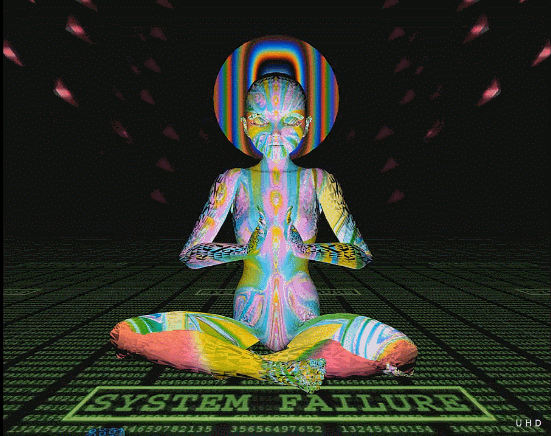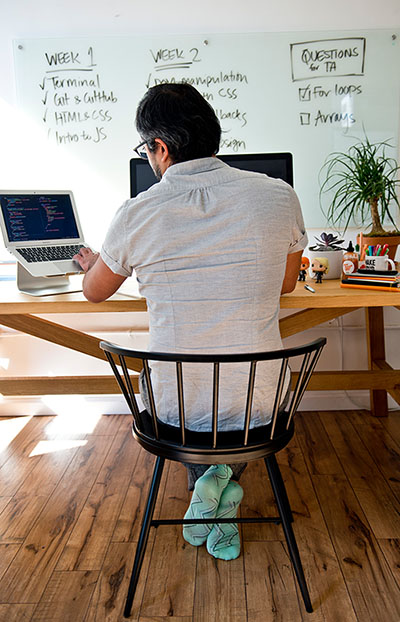The fast-paced nature of the tech industry is what draws many to it. The pace can allow for accelerated learning, plentiful growth opportunities, and the ability to make a significant impact. The downside is that, if not managed effectively, it can lead to stress and burnout.
When it comes to a career in software development, it might seem like the best way to learn programming is to dive in and never come up for air. But if you’re under the impression this is how to get better at programming, we’re here to tell you that’s not the case. Pairing your professional development with mindfulness practices is the best way to succeed as a software developer.
In today’s environment, many teams have been impacted by layoffs, resulting in more work for remaining and new team members, and more pressure to perform. Setting boundaries and implementing mindfulness practices is more essential than ever —not only for your mental health but also for your work quality and productivity.
This article reviews ten tips for mindfulness for developers — to help you get better at programming without neglecting your well-being.
Tip #1: Self-check-In
66% of engineers globally work from home. While there are a lot of perks to remote work, it can also be isolating.
That’s why it’s essential to be intentional about checking in with yourself throughout the workday. The small adjustments you make when you’re aware of what’s going on in your body and mind can make a big difference over time.
For example, you might check in and realize you’re tensing your shoulders. While this might not seem like a big deal in the moment, it can have real ramifications in the long run (Think back pain and stiffness).
Try setting yourself reminders to take a pause and tune in. Here are some examples of questions you can ask yourself in those moments.:
- How am I feeling right now? Am I breathing? Am I tense?
- What’s making me feel stressed right now?
- Do I need to take a break to reset?
- How can I motivate myself through the next challenging task?
- Am I being held back by imposter syndrome?

Tip #2: Stop multitasking
When there’s a lot to get done, it can feel like multi-tasking is the only way to accomplish everything. But unless you’re one of the 2.5% of people who can effectively process tasks simultaneously, multitasking has the opposite effect.
Switching between multiple tasks is estimated to hurt productivity by 40%.
While it might seem impossible to eliminate multitasking from your days, there are several strategies you can employ to help gain more uninterrupted focus time, including:
- Setting aside time for distractions: For example, if you find yourself going back and forth between coding and email, try dedicating an hour each morning to clearing your inbox, so you can forget about it for the rest of the work day.
- Blocking off your most productive hours: Most people have times of the day when they’re most productive– maybe it’s first thing in the morning, maybe it’s the last hour of the day. Whatever it may be, make sure you’re taking advantage of this time and don’t let it get monopolized by meetings.
- Putting your phone away: Phones are the ultimate distraction. While it might seem like no big deal to answer your text or check Instagram in the middle of a task, it’s multitasking— pulling your mind away from the flow of focus.
Tip #3: Practice open communication
When it comes to work and mindfulness, we can’t stress the importance of open communication enough.
Dealing with things alone or in silos can cause unnecessary work stress. Make sure you create an environment on your team that’s conducive to open communication. This leads to increased psychological safety (the most important quality of an effective team), and overall a more positive work environment.
Here are some strategies to ensure continued communication on your software engineering team:
- Set expectations: Whether about work projects, communication preferences, etc., make sure expectations are communicated.
- One-on-ones: One-on-ones are a great space for open communication in a safe and private environment. Use them to address capacity issues, talk about burnout, and generally how you’re feeling at work.
- Address issues as they arise: Don’t let conflicts fester. If you’re putting off a difficult message because you’re not sure how to word it, don’t be afraid to leverage a tool like ChatGPT as a starting point.
Tip #4: Lean into empathy
To fully uncover the benefits of open communication, empathy is essential. Being mindful isn’t only about being more aware of your own emotions and thoughts, it’s also essential for improving your connection with others.
Leaning into empathy helps you be more aware of and sensitive to what other people are experiencing — improving your ability to work together effectively.
So next time you’re in a difficult conversation with someone, try to understand the situation from their point of view. Here are three steps to help nurture empathetic discussions:
- Actively Listen: Are you listening? Or are you formulating your response in your head while your colleague speaks? Active listening means being present and focusing on what the other person is saying.
- Take a pause: Think before you respond. It might seem simple, but if a conversation evokes an emotional response, you’ll likely feel eager to speak your mind. Pausing before speaking is a helpful step to organize your feelings and respond thoughtfully.
- Repeat back what they’re saying: A great way to pause before giving your own opinion is to repeat back what the person is saying to you. This will help you process it and also demonstrates that you’ve listened.

Tip #5: Try guided meditation
Mediation has long been touted as a remedy for many mental challenges, from anxiety to stress to memory to mood.
While it can seem intimidating to sit with your thoughts for an extended period, luckily there are tools available to help you get started. Apps like Headspace and Calm are accessible ways to start practicing meditation in the comfort of your home.
This doesn’t mean you need to set aside 30 minutes every day to meditate. Start small by sitting for 5 minutes a day and work yourself up to more time as you’d like.
As with anything, consistency is key. The more consistent you are with the practice, the more you’ll be equipped to handle stressful situations as they arise.
Tip #6: Set daily intentions
It’s easy to get buried in the day-to-day life of a developer without being mindful of your “why”, and all that you’re accomplishing each day.
A great way to start your day and improve your awareness is to set an intention and write it down.
Setting daily intentions allows you to meet yourself where you’re at each day. Not every day will be as productive as the next. It’s helpful to check in with yourself and set realistic intentions for what you want each day to look like — resulting in more patience for yourself and others.
The act of writing down your intentions is an important step. According to Forbes, people who very vividly describe or picture their goals are 1.2-1.4 times more likely to accomplish their goals. It also allows you to revisit your intention throughout the day.

Tip #7: Optimize your workspace
The beauty of work-from-home is that there are so many tools at your disposal to enhance your mindfulness. While it might not be socially acceptable to start doing yoga in the middle of the office, you most definitely can in the comfort of your own home.
There are several ways you can organize your space to take advantage of work-from-home tools to enhance mindfulness, including:
- Decluttering and organizing: Clutter can be both physical and digital and can have a significant impact on anxieties. That’s why it’s important to keep your space organized. So take five minutes at the beginning of the day to throw out the old papers you don’t need anymore, bring your empty cups to the kitchen, empty your downloads folder, or do whatever you need to make more space.
- Adding a personal touch: While it’s beneficial for your workspace to be organized, it doesn’t need to be boring. After all, you’re spending a lot of time there each day. Make it personal by adding photos, artwork, plants, or anything that brings you joy.
- Create a space for breaks: This could mean simply having separate chairs for working and not working. Or maybe you have a yoga mat or meditation cushion nearby. Whatever your break of choice is, make sure it’s accessible and an intentional part of your workspace setup.
Tip #8: Embrace mindful eating habits
Stress has a significant impact on eating habits. Typically when we’re stressed, one of two things happens: One, we don’t eat at all. Or two, we crave high-calorie, high-fat foods to help cope. In fact, according to The American Psychological Association, 38% of adults say they’ve overeaten or eaten unhealthy foods in the past month because of stress. Almost half of these adults (49%) report engaging in these behaviors weekly or more.
But, eating well is a significant part of brain health and overall well-being.
While it can feel tempting to work right through lunch, scarfing down some fast food while deep into coding, try taking a break to eat. Even if it’s only 15 minutes, eating away from your desk is a healthy practice, allowing you to be mindful of your eating habits.
Tip #9 Spend time in nature
Over the years, many studies have demonstrated the positive effects of nature on health. In one study, it was found that forest environments help reduce acute emotions like chronic stress.
But you don’t need access to a forest to reap the benefits of being in nature. Spending quality time immersed in the environment can include doing things like:
- Going for a walk in your neighborhood
- Going to a local park
- Sitting outside to eat
- Camping on the weekend
Finding little moments to get outside can make a big difference in your day-to-day life.
Tip #10 Drink water & exercise
So much coding, so little time. That’s what it can feel like anyways. But there’s never too little time to give your body what it needs, namely: water and exercise.
According to the Institute of Medicine of the National Academies, adults should drink between 2.7-3.7 liters of water a day. And based on research by JAMA, adults should also be getting in 7,000 daily steps.
If you’re struggling to remember these healthy habits, leverage technology innovations, like smartwatches, to prompt you to drink your water and get some movement in. While it requires you to pause the work you’re doing, in the long run, it’ll help increase productivity.
The best way to learn programming is mindfully
Mindfulness is the most underrated skill to learn and get better at coding. It protects your well-being, while also increasing focus and productivity.
With the fast-paced nature of the job, it can be the easiest thing to neglect. Try employing these 10 tips, from self-check-ins, to exercise, to mindful eating habits, to help support a more mindful career in software development.
If you’re looking to hone more valuable web development skills to help with a career change or professional development — learn more about a career in web development at General Assembly.